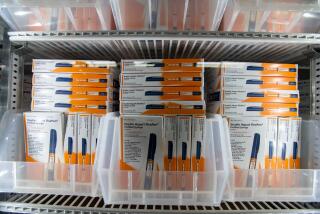Medical Firms Take a Scalpel to the FDA
A hallmark danger of this era is that the public’s business is becoming privatized. Industry wants to replace public processes and public agencies with private contractors and private deals. And there is far too little public protest.
Private enemy No. 1 seems to be the Food and Drug Administration. Consider the proposed tobacco accord.
A group of self-appointed spokesmen for the public’s health and some state attorneys general have cut a deal that limits the industry’s total liability for damages and reins in the FDA. In return, there will be more research and more anti-tobacco advertising, as well as $368.5 billion to be divided among states and other claimants.
The deal was negotiated in secret. And two of the most distinguished public health officials, former Surgeon General C. Everett Koop, a Republican, and former FDA Commissioner David Kessler (who served both Presidents Bush and Clinton), say the deal stinks. How good can it be if the tobacco industry is lobbying for its approval by Congress?
Now another industry has big plans for emasculating the FDA. The medical device industry is working closely with key senators to limit the FDA’s ability to assure the safety and efficacy of everything from artificial heart valves to super-tampons.
The bill is a response to the industry’s complaints that FDA reviews take too long. For the most part, these charges are baseless. The General Accounting Office found that the time it takes the FDA to review a medical device application has declined since 1992-1993. This trend was confirmed in a survey by a leading trade paper, Medical Device and Diagnostic Industry magazine, which showed that in 1997, only 20% of industry executives complained about FDA policies, down from 47% in 1994.
This $50-billion-a-year business is one of America’s most profitable. Investment advisors love its 8% annual growth rate and its large global export market.
The industry’s remedy, a bill sponsored by Sen. James M. Jeffords (R-Vt.), would partly privatize the FDA’s crucial function of certifying safe products. Instead of having to pass muster with the FDA, a manufacturer could submit a new product to a private review firm selected by the very company seeking approval. And these same private consultants could do other contract work for the device manufacturers, setting up an exquisite conflict of interest.
The proposed bill would also weaken the FDA’s authority to track defective products and would lower the standard of proof to find a product safe and effective.
Congress did not put medical devices under the FDA’s jurisdiction out of idle fondness for bureaucrats. Devices were first regulated in 1976, after the notorious Dalkon Shield scandal, in which A.H. Robins’ intrauterine contraceptive device and similar products left thousands of women sterile and 18 dead.
The pity is that another proved approach is available for accelerating new product reviews, one that strengthens rather than guts the FDA. Responding both to industry and consumer concerns that new drug approvals were taking too long, Congress in 1992 passed the Prescription Drug User Fee Act. It allowed the FDA to hire additional scientists to expedite approvals, using fees paid by companies seeking fast-track review. The drug industry and consumer groups both count it a success.
Congress should simply extend that approach to medical devices. But the device industry prefers instead to privatize FDA reviews and appears to have the necessary votes.
American drug and medical device companies are globally preeminent, in part because the FDA offers their products a worldwide seal of approval that consumers trust. We need such public agencies because the temptations are simply too great for industry to police itself--and the consequences of private lapses too tragic. The senators whose heads have been turned by the importunings of private businesses should direct themselves instead to the public’s business.
More to Read
Inside the business of entertainment
The Wide Shot brings you news, analysis and insights on everything from streaming wars to production — and what it all means for the future.
You may occasionally receive promotional content from the Los Angeles Times.










